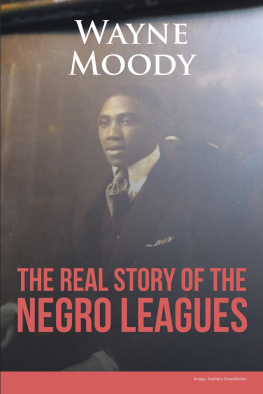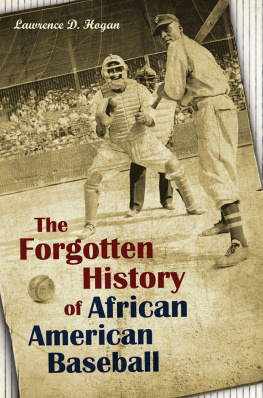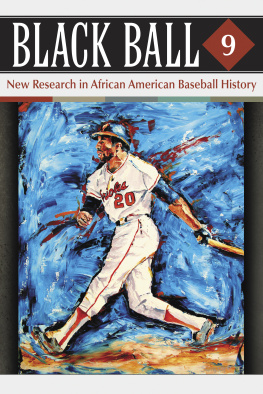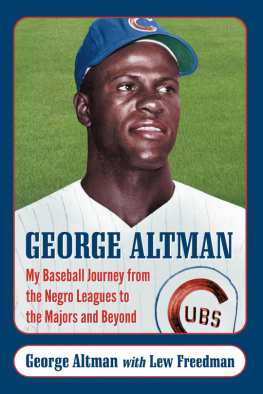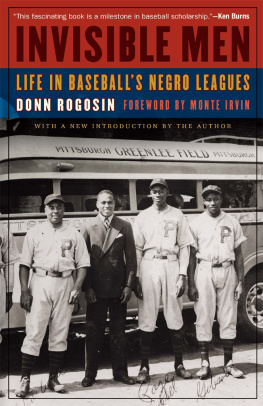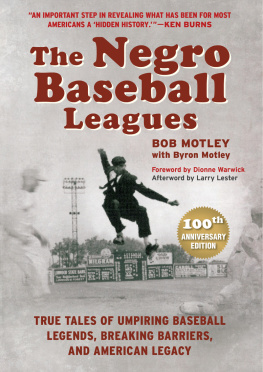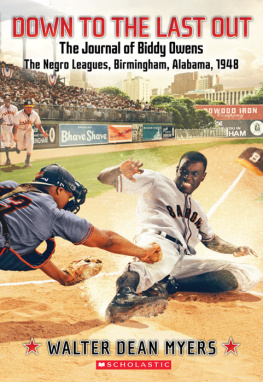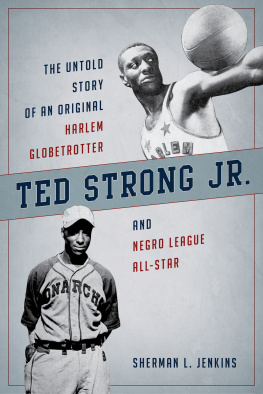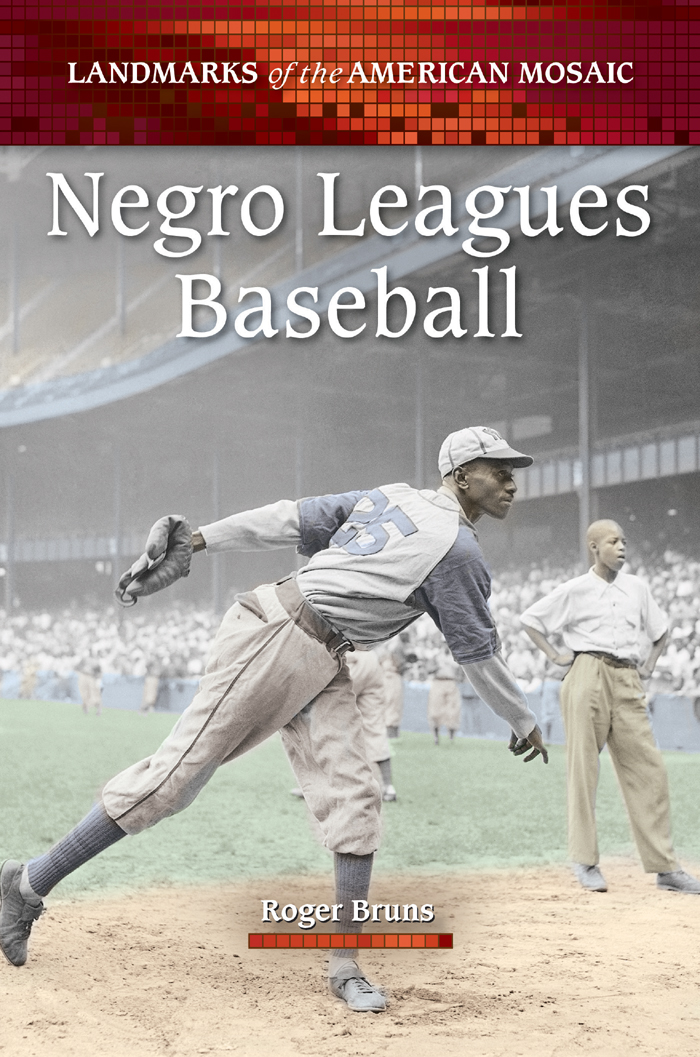ROGER BRUNS is a historian and former deputy executive director of the National Historical Publications and Records Commission at the National Archives in Washington, DC. He is the author many books, including Icons of Latino America: Latino Contributions to American Culture; Preacher: Billy Sunday and the Rise of American Evangelism; and Almost History. He has written several biographies for young readers of such figures as Martin Luther King Jr., John Wesley Powell, and Thomas Jefferson.
NEGRO LEAGUES BASEBALL
ROGER BRUNS

Copyright 2012 by ABC-CLIO, LLC
All rights reserved. No part of this publication may be reproduced, stored in a retrieval system, or transmitted, in any form or by any means, electronic, mechanical, photocopying, recording, or otherwise, except for the inclusion of brief quotations in a review, without prior permission in writing from the publisher.
Library of Congress Cataloging-in-Publication Data
Bruns, Roger.
Negro Leagues baseball / Roger A. Bruns.
p. cm. (Landmarks of the American mosaic)
Includes index.
ISBN 978-0-313-38648-0 (hardback) ISBN 978-0-313-38649-7 (ebook) 1.BaseballUnited StatesHistory. 2.Negro leagues. 3.African American baseball players. 4.Discrimination in sportsUnited States. I.Title.
GV863.A1B784 2012
796.3576408996073dc23 2011052169
ISBN: 978-0-313-38648-0
EISBN: 978-0-313-38649-7
16 15 14 13 12 1 2 3 4 5
This book is also available on the World Wide Web as an eBook.
Visit www.abc-clio.com for details.
Greenwood
An Imprint of ABC-CLIO, LLC
ABC-CLIO, LLC
130 Cremona Drive, P.O. Box 1911
Santa Barbara, California 93116-1911
This book is printed on acid-free paper
Manufactured in the United States of America
Contents
Series Foreword
The Landmarks of the American Mosaic series comprises individual volumes devoted to exploring an event or development central to this countrys multicultural heritage. The topics illuminate the struggles and triumphs of American Indians, African Americans, Latinos, and Asian Americans, from European contact through the turbulent last half of the 20th century. The series covers landmark court cases, laws, government programs, civil rights infringements, riots, battles, movements, and more. Written by historians especially for high school students on up and general readers, these content-rich references satisfy more thorough research needs and provide a deeper understanding of material that students might only otherwise be exposed to in a short section in a textbook or superficial explanation online.
Each book on a particular topic is a one-stop reference source. The series format includes
- Introduction
- Chronology
- Narrative chapters that trace the evolution of the event or topic chronologically
- Biographical profiles of key figures
- Selection of crucial primary documents
- Glossary
- Bibliography
- Index
This landmark series promotes respect for cultural diversity and supports the social studies curriculum by helping students understand multicultural American history.
Introduction
In March 1968, the eminent civil rights leader Dr. Martin Luther King Jr. visited his friend Don Newcombe in Los Angeles. King was planning a trip to Memphis, Tennessee, to support striking sanitation workers in their fight for fair treatment and wages. Newcombe, now over 40 years old and retired from a Hall of Fame career as a pitcher, almost entirely with the Brooklyn Dodgers, had been one of the first black players from the Negro Leagues to integrate major league baseball. Following his teammate Jackie Robinson, who broke the long-standing color barrier in 1947, Newcombe, along with other black players who first appeared on major league clubsmen such as Larry Doby of the Cleveland Indians, Willie Mays of the New York Giants, Roy Campanella of the Dodgers, and othershad endured death threats, taunts, ridicule, and humiliating treatment meted out not only by fans and opposing players but even, on occasion, by teammates. They had been pioneers and Dr. King realized it.
While eating together in a restaurant, King said to Newcombe, Don, youll never know how easy you and Jackie and Doby and Campy made it for me to do my job by what you did on the baseball field. It was praise Newcombe cherished. He later said, Imagine, here is Martin getting beaten with billyclubs, bitten by dogs and thrown in jail, and he says we made his job easier (Vecsey 2009).
On that trip to Memphis, a month after his conversation with Newcombe, King was assassinated on April 4, 1968, at the Lorraine Motel. It was a place where, in the mid-1950s, Newcombe, Robinson, Campanella, and other black players had stayed during winter trips to play exhibition games in the South.
The story of black baseball from the time of the American Civil War to the integration of the major leagues in the late 1940s is far more than a story about sports; it is also the story about the fight for civil rights and human dignity and the battle against racism and bigotry.
Ernest Burke, who was in the Negro Leagues with the Baltimore Elite Giants, remembered some of the conditions black players encounteredthe lack of accommodations, the few places to eat, the constant degrading incidents:
When we played outside of Baltimore, ah travel conditions, like I said before, it was bad, because if we stayed, went to a small town, especially a southern town, and pulled up to a gas station or something like that, they would come out and say what do you niggers want here, what can I what, what do you want, and wed say we want gas. And theyd tell us to pull over to the side well get you in a minute. And I can remember one time we stayed at a service station almost two hours, before they came out and said Ill give you five gallons of gas, and get your ass out of here I could never believe that people would be so harsh, and so, so evil against another man because of the color of his skin. (Burke, 1998)
Nevertheless, black players enthusiastically embraced the game. They organized teams and leagues, played before admiring black fans, took on with much success some of the best major league players in off-season exhibition games, gained a following from black sportswriters, and battled for recognition. For over half a century, black players, many with talent equal to any player in the major leagues, took the field in the shadow of white baseball. Yet, in the end, baseball became one of the first areas of American society to integratebefore the armed forces, before public schools, and before many of the historic civil rights battles of the 1960s. This is the story of fortitude and courageof players, owners, and sportswriters who, in giving their all to the sport they loved, were part of a long march, against great odds, to due respect and admiration.
REFERENCES
Burke, Ernest. 1998. Excerpts of Interview, Special Collections Department, Langsdale Library, University of Baltimore.
Vecsey, Peter. 2009. From Jim Crow to Obama, Newcombe Has Seen it All, New York Post, January 20. http://www.nypost.com/p/sports/more_sports/item_AjvXS2VJKbxzfxZAX3BmtK.
Chronology of Negro Leagues Baseball
1860s Although without professional organization, baseball is widely popular across the country. For example, a story in the Washington, DC,


